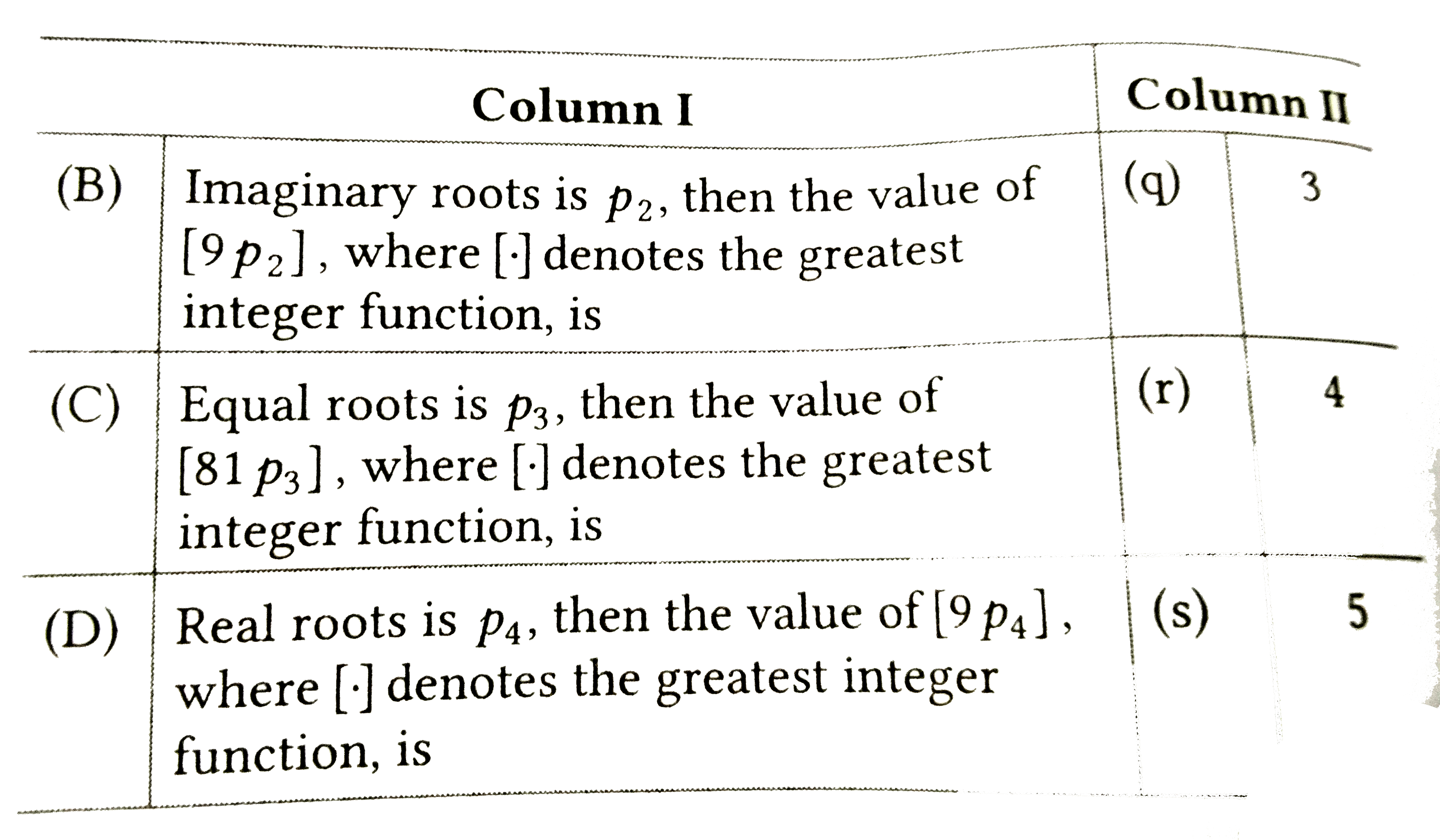Two numbers b and c are chosen at random with replacement from the numbers 1, 2, 3, 4, 5, 6, 7, 8 and 9. Find the probability that x2+bx+c>0 for all x∈R.
To find the probability that the quadratic equation x2+bx+c>0 for all x∈R, we need to ensure that the discriminant of the quadratic is less than zero. The discriminant D is given by:
D=b2−4c
For the quadratic to be positive for all x, we require:
D<0⟹b2−4c<0⟹b2<4c⟹c>b24
Step 1: Determine the Range of Values for b and c
The numbers b and c are chosen from the set \{1, 2, 3, 4, 5, 6, 7, 8, 9\}.
Step 2: Calculate the Possible Values of c for Each b
We will evaluate the condition c>b24 for each possible value of b:
- If b=1:
c>124=14⟹c≥1(possible values: 1 to 9)
Possible values of c: 1, 2, 3, 4, 5, 6, 7, 8, 9 (9 values)
- If b=2:
c>224=1⟹c≥2(possible values: 2 to 9)
Possible values of c: 2, 3, 4, 5, 6, 7, 8, 9 (8 values)
- If b=3:
c>324=2.25⟹c≥3(possible values: 3 to 9)
Possible values of c: 3, 4, 5, 6, 7, 8, 9 (7 values)
- If b=4:
c>424=4⟹c≥5(possible values: 5 to 9)
Possible values of c: 5, 6, 7, 8, 9 (5 values)
- If b=5:
c>524=6.25⟹c≥7(possible values: 7 to 9)
Possible values of c: 7, 8, 9 (3 values)
- If b=6:
c>624=9⟹c≥10(no possible values)
Possible values of c: None (0 values)
- If b=7:
c>724=12.25⟹c≥13(no possible values)
Possible values of c: None (0 values)
- If b=8:
c>824=16⟹c≥17(no possible values)
Possible values of c: None (0 values)
- If b=9:
c>924=20.25⟹c≥21(no possible values)
Possible values of c: None (0 values)
Step 3: Total Favorable Outcomes
Now, we sum the number of favorable outcomes:
- For b=1: 9 values
- For b=2: 8 values
- For b=3: 7 values
- For b=4: 5 values
- For b=5: 3 values
- For b=6,7,8,9: 0 values
Total favorable outcomes = 9+8+7+5+3=32
Step 4: Total Possible Outcomes
Since b and c can each take any of the 9 values independently, the total number of outcomes is:
9×9=81
Step 5: Calculate the Probability
The probability P that x2+bx+c>0 for all x∈R is given by:
P=Number of favorable outcomesTotal outcomes=3281
Final Answer
The required probability is:
3281
c>124=14⟹c≥1(possible values: 1 to 9)
Possible values of c: 1, 2, 3, 4, 5, 6, 7, 8, 9 (9 values)
c>224=1⟹c≥2(possible values: 2 to 9)
Possible values of c: 2, 3, 4, 5, 6, 7, 8, 9 (8 values)
c>324=2.25⟹c≥3(possible values: 3 to 9)
Possible values of c: 3, 4, 5, 6, 7, 8, 9 (7 values)
c>424=4⟹c≥5(possible values: 5 to 9)
Possible values of c: 5, 6, 7, 8, 9 (5 values)
c>524=6.25⟹c≥7(possible values: 7 to 9)
Possible values of c: 7, 8, 9 (3 values)
c>624=9⟹c≥10(no possible values)
Possible values of c: None (0 values)
c>724=12.25⟹c≥13(no possible values)
Possible values of c: None (0 values)
c>824=16⟹c≥17(no possible values)
Possible values of c: None (0 values)
c>924=20.25⟹c≥21(no possible values)
Possible values of c: None (0 values)
- For b=2: 8 values
- For b=3: 7 values
- For b=4: 5 values
- For b=5: 3 values
- For b=6,7,8,9: 0 values
Topper's Solved these Questions
Similar Questions
Two numbers xandy are chosen at random (without replacement) from among the numbers 1,2,3,2004. The probability that x3+y3 is divisible by 3 is (a) 13 (b) 23 (c) 16 (d) 14
View SolutionIf a number x is chosen at random from the numbers −2, −1, 0, 1, 2 . What is the probability that x2<2 ?
View SolutionIf a number x is chosen at random from the number −2,−1,0,1,2. What is the probability that x2<2?
View SolutionTwo natural numbers x and y are chosen at random from the set {1,2,3,4,...3n}. find the probability that x2−y2 is divisible by 3.
View SolutionTwo integers xandy are chosen with replacement out of the set {0,1,,2,3,.....10}. Then find the probability that |x−y|>5.
View SolutionTwo numbers a and b are chosen at random from the set {1,2,3,4,...,0} with replacement. The probability that the equation x2+√2(a−b)x+b=0 has


View SolutionTwo integers xandy are chosen with replacement out of the set {0,1,,2,3,10}. Then find the probability that |x−y|>5.
View SolutionA number x is chosen at random from the numbers −3, −2, −1, 0, 1, 2, 3 the probability that |x|<2 is 57 (b) 27 (c) 37 (d) 17
View SolutionIf a digit is chosen at random from the digits 1, 2, 3, 4, 5, 6, 7, 8, 9 , then the probability that it is odd, is
(a)49
(b) 59
(c) 19
(d) 23
View SolutionIf a digit is chosen at random from the digits 1, 2, 3, 4, 5, 6, 7, 8, 9 , then the probability that the digit is even, is
(a)49
(b) 59
(c) 19
(d) 23
View Solution
